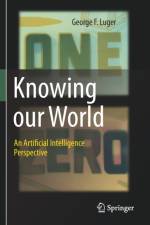av George F. Luger
747
This comprehensive collection of twenty-nine readings covers artificial intelligence from its historical roots to current research directions and practice. With its helpful critique of the selections, extensive bibliography, and clear presentation of the material, Computation and Intelligence will be a useful adjunct to any course in AI as well as a handy reference for professionals in the field. The book is divided into five parts. The first part contains papers that present or discuss foundational ideas linking computation and intelligence, typified by A. M. Turing's "Computing Machinery and Intelligence". The second part, Knowledge Representation, presents a sampling of the numerous representational schemes - by Newell, Minsky, Collins and Quillian, Winograd, Schank, Hayes, Holland, McClelland, Rumelhart, Hinton, and Brooks. The third part, Weak Method Problem Solving, focuses on the research and design of syntax based problem solvers, including the most famous of these, the Logic Theorist and GPS. The fourth part, Reasoning in Complex and Dynamic Environments, presents a broad spectrum of the AI communities' research in knowledge-intensive problem solving, from McCarthy's early design of systems with "common sense" to model based reasoning. The two concluding selections, by Marvin Minsky and by Herbert Simon, respectively, present the recent thoughts of two of AI's pioneers who revisit the concepts and controversies that have developed during the evolution of the tools and techniques that make up the current practice of artificial intelligence.



